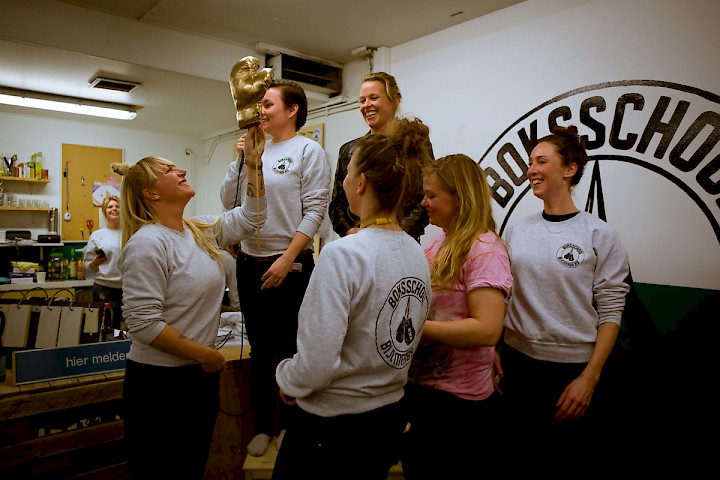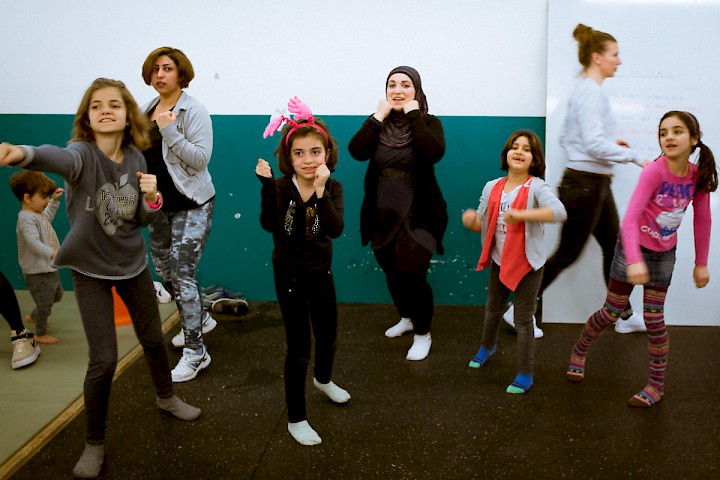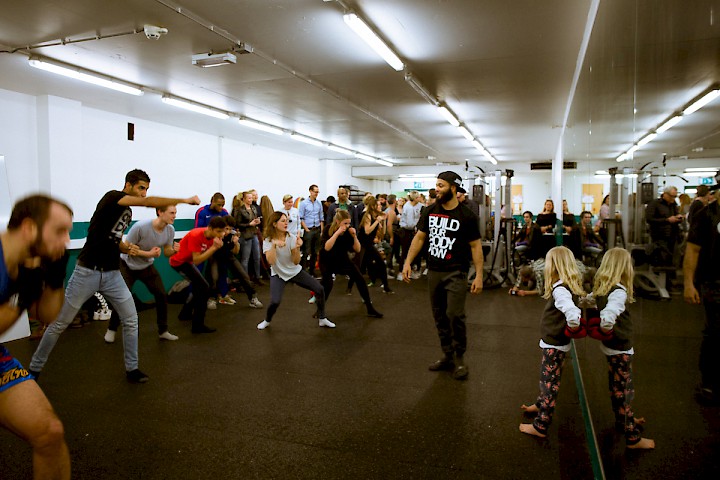Boksschool Bijlmerbajes
Deprecated: preg_split(): Passing null to parameter #3 ($limit) of type int is deprecated in /domains/lolalik.nl/DEFAULT/site/modules/TextformatterTextile/src/Parser.php on line 2227
“Ten.” A collective grunt is heard across the room as people of various shapes and sizes aim a kick at a punching bag held by their sparring partner.
“Nine.” The room explodes into action again.
“Eight. Seven. Six. Five. Four.” Laughter starts to break out as exhaustion sets in.
“Three. Two. One.” A final dull thud echoes around the room, followed by sighs of relief, and then it’s time to swap places and go again.
Of all the projects at Lola Lik, the Boksschool is definitely the most physically demanding. Started in early 2017, it is the brainchild of five born-and-bred Amsterdammers: Willempje Vrins, Maartje Piersma, Hanne Hoekstra, Stien Meesters and Nicole Rietvelt.
“Two of us [Piersma and Meesters] created the Solar World Cinema here and that’s when they came across the basement, an old shooting range,” explains Rietvelt. “There was an old boxing bag in there and the moment we saw it we had the idea to make a boxing school.”
From this seed of an idea grew a full-fledged boxing and kickboxing gym. They got the sporting equipment for free from various contacts in the city, and relied on friends to help them clean up the space and build a reception and changing rooms. By March, they were ready to start with some free trial lessons.
“People were very enthusiastic,” says Rietvelt. “It really appealed to a lot of people. The Bijlmerbajes prison is famous in Amsterdam, so a lot of people were curious to see inside it. Plus Lola Lik is an attraction in itself.” It was also hit amongst refugees, both from the adjoining AZC (asylum seekers center) and from surrounding neighbourhoods. “I was really surprised,” says Rietvelt. “Quite a few people had actually practiced kickboxing in their own countries. We have one girl from Iran who used to do martial arts.”
The aim of Lola Lik is to foster interaction between locals and new arrivals and facilitate better integration – so with that in mind, the Boksschool decided to do all their classes in Dutch. “Everyone coming here has to learn it anyway so it’s useful,” explains Rietvelt. “We demonstrate everything and when we are really stuck we use Google Translate. We also translated the schedule and rules into Arabic, as most of the non-Dutch people who come here speak that.”
The classes are held at various times on Tuesday, Wednesday, Thursday and Sunday, and have proved very popular. Various price options are available for participants, and it is completely free to refugees.
Part of their success lies in the atmosphere they cultivate: relaxed, unpretentious, inclusive and above all, fun. Dance and pop hits help propel the classes along, and the teachers are always on hand to answer questions or help you perfect your technique. They provide everything, so no equipment or special clothes are needed, and everyone works out barefoot.
“We’re not a ‘gym bunny’ gym,” laughs Rietvelt. “Whatever your level, whatever your age, man, woman, whatever you wear, everyone is welcome. None of us wanted to create a regular gym, we just wanted to create a place where people can meet other people and have a good time, a place where people can do sports and interact.”
It’s clear from the beaming faces and friendly chatter at the end of the class that the Boksschool has succeeded in this. One of those lingering behind is Mohammad Akkawi, a new recruit. “When I was in Syria I loved to play sport,” says Akkawi, a 19-year-old from Tartous Banias, western Syria. “I played ping pong, I swam – it was a great way to have fun and meet people. So when my friend told me about this class I decided to come.”
“I like it, but it’s very tiring,” he says with a laugh. Akkawi came to the Netherlands with his two older brothers two years ago. After making his way through three different AZCs, he finally ended up at the Bijlmerbajes center, where he lived for seven months before getting his own place in June this year. During that time he worked as a barista for the Refugee Company, something he now does professionally for a cafe in Oud West. He speaks very good English and is currently learning Dutch so that he can continue his high school studies and go to university.
“There was nothing like this lola lik in the other camps,” says Akkawi. “At one camp I saw nothing but cows and villages. It was very difficult.”
“Lola Lik is like my second home,” he continues. “I made a lot of friends here who are now like my brothers, and that includes many Dutch people. This is the most important thing for me.”
Interested in joining a lesson? Check the website of Boksschool Bijlmerbajes for more information.


